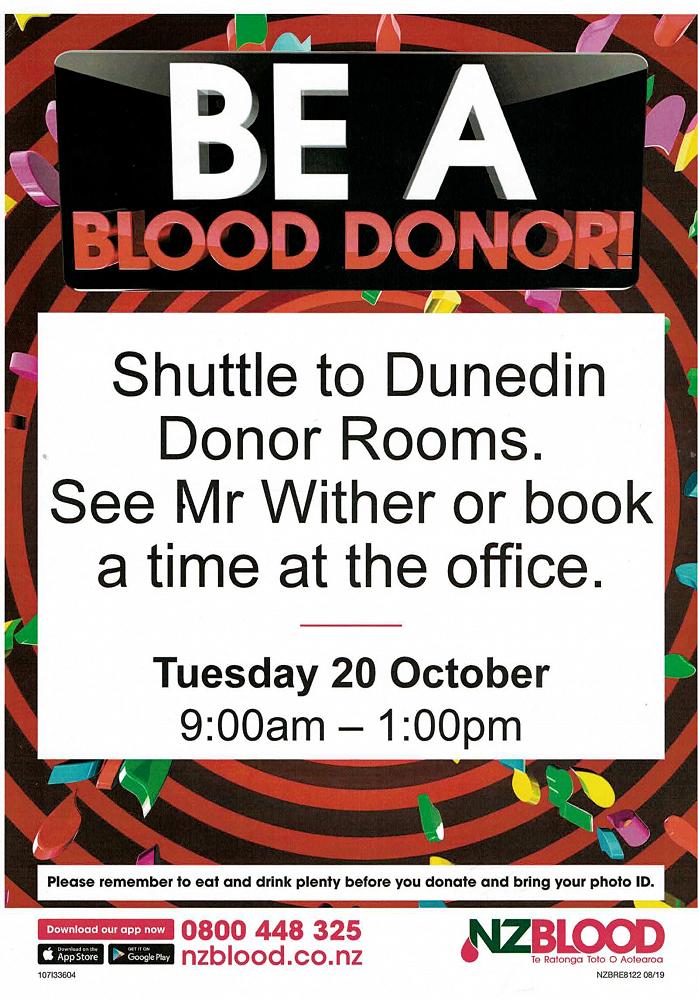
Be a Blood Donor
Tēnā koutou to all parents and/or caregivers of our Year 13 students.
Further details are provided below for Year 13 students that may wish to donate blood via the New Zealand Blood service and also for parents around their son's potential eligibility to donate blood as outlined by the New Zealand Blood Service.
It outlines specifically eligibility criteria including several constraints that include age, weight, health and travel. Please read carefully before giving permission.
While the NZ Blood Service information outlines that anyone over 16 has the right to self determine around donating blood.
As a school we do still have a duty of care for students, as this involves transport offsite and other care arrangements/contingences for people giving blood that are being provided by an outside provider ie the NZ Blood Service.
So with this mind, we will be shortly emailing all parents/caregivers of Year 13 students the information provided from this newsletter, and also a simple digital permission slip for parents to sign if any eligible Year 13 students wish to donate blood.
If you have any concerns and/or issues you are welcome to contact me via email: rob.wither@obhs.school.nz
OBHS / NZBS Blood Drive
Tuesday 20 October 2020
9am - 1pm
It is important that we encourage students into a lifetime habit of donating blood and making a worthwhile contribution to their community.
The Care of Children Act 2004 allows people 16 years and over to make their own decisions about whether or not they wish to give blood.
NZBS recommends that students discuss becoming a blood donor with their family. If families have a particular objection to the student choosing to donate blood, please make sure this is known to the student and to the school before the blood drive date.
NZBS respects the privacy of all donors and recommends conversations around blood donor eligibility is carried out sensitively. If you require any further information please call 0800 GIVE BLOOD (0800 448 325) or visit www.nzblood.co.nz
Becoming a blood donor…
Age:
First time donors
16 to 65 years of age.
Existing donors
Up to 71 years of age.
Height /Weight: Weigh at least 50kg – First-time donors under 25 years of age must also meet the height and weight criteria. Use our handy calculator on our website at www.nzblood.co.nz to find out if you can donate.
Health:
· You must be in good health.
· You cannot donate if you have a cold, flu, sore throat, cold sore, stomach bug or any other infection.
· If you have recently had a tattoo or body piercing you cannot donate for 4 months from the date of the procedure.
· If you have visited the dentist for a minor procedure you must wait 24 hours before donating; for major work wait a month.
Travel:
· You must not have lived in the United Kingdom, France or the Republic of Ireland between 1980 and 1996 for more than 6 months or received a blood transfusion in ANY of these countries since 1980.
· If you have been overseas recently, please refer to the “Donating after Travelling” tool available at www.nzblood.co.nz to find out when you can donate.
Food: You must have eaten some food during the four hours prior to donation.
Identification: You need to bring suitable identification with you. Examples of acceptable ID are driver’s licence, birth certificate or passport. A Student ID Card is acceptable if it features full name, date of birth and a photograph.
With your consent we may also ask the school to confirm you are at least 16 years of age.
Important facts about blood
· There is no substitute for human blood -healthy donors are the only source of our blood supply.
· Around 29,000 patients are treated with blood or blood products in New Zealand each year.
· A blood donation is separated into different components, each of which is used to treat different patients - accident trauma, patients undergoing surgery, people with leukaemia, transplant patients and many others. Blood products are also used for immunisation to help prevent diseases such as hepatitis A and B, tetanus and chickenpox.
· Each donation can help save up to 3 people - blood donors are literally lifesavers!
